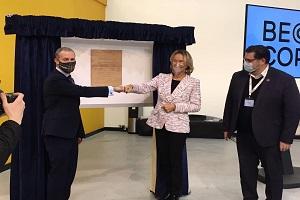
UNECE re-launched its High-Performance Buildings Initiative at COP-26 to deliver on the Paris Agreement and the 2030 Agenda for Sustainable Development. At a ceremony at the Construction Scotland Innovation Centre (CSIC) in Hamilton, today, 8 International Centres of Excellence on High Performance Building (ICE-HPB) joined the network of centres that is at the heart of the initiative. 35 additional centres are in the process of joining.
Representatives of centres in Bulgaria, Canada, Northern Ireland, Ireland, Scotland, London, New York, Washington DC, Pittsburgh, and Maine participated in the signing ceremony and were joined by Michael Matheson, Scottish Government Cabinet Secretary for Net Zero, Energy and Transport, and UNECE Executive Secretary Olga Algayerova.
Ms. Algayerova noted that “buildings and the built environment are highest priority for action by communities and by countries to deliver not only the Paris Agreement, but also the whole 2030 Agenda. Buildings are critical across all the sustainable development goals. The goals go beyond decarbonization, though decarbonization is the most urgent as the climate crisis is existential. Success with this initiative will break the historic link between development and carbon emissions.”
The built environment and construction sector are central to tackling climate change as buildings consume 70% of electricity globally and account for 40% of CO2 emissions. High-performance buildings use minimal amounts of energy for heating, cooling, lighting, and ventilation, feature high performing systems and advanced information and communication technology, connect with systems for transport, water and waste management, and the other services that buildings offer. The outcomes are enhanced quality of life for occupants, resource efficiency, and climate mitigation.
The High-Performance Buildings Initiative is conceived to enhance quality of life across a spectrum of outcomes including not only energy and carbon intensities, but also health, resilience, and affordability. The International Centres of Excellence are a network of community-focused organisations that engage local professional, regulatory, and policy actors to raise the performance of the buildings supply chain globally. Their ability to deliver substantial support to the building sector in their local area is enhanced by regular engagement with a dynamic network of actors committed to improving the performance of the world’s built environment. Providing education, training, and other critical resources the centres will support their local industries to move forward in line with the UN Framework Guidelines for Energy Efficiency Standards in Buildings. They will also collaborate with one another to share resources and knowledge internationally.
“We are thrilled to welcome new partners to our growing global network of International Centres of Excellence on High Performance Buildings,” said Richard Yancey, FAIA, Executive Director, Building Energy Exchange, founding ICE-HPB. “Our network of localized centres for education and action promises to share and disseminate knowledge, solutions, and best practices that will rapidly accelerate our transition to low carbon, healthy buildings, and a better future for everyone everywhere."
Working alongside the centres of excellence as part of the initiative is a global network of academic institutions committed to addressing research and education gaps on buildings and to educating next generation professionals and trades people. The industries that comprise the global building sector will provide proofs of concept and case studies through partnerships with the various players in the High-Performance Buildings Initiative. Finally, the initiative has gathered thought leaders in the building space to develop a UN protocol for the built environment, and that work is underway.